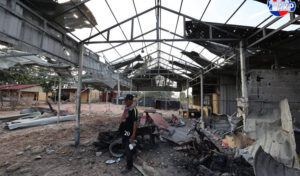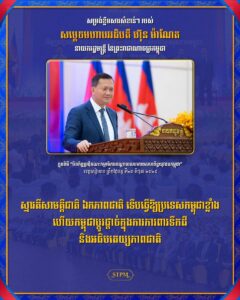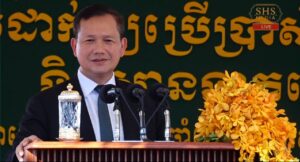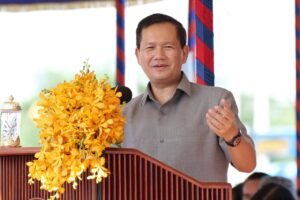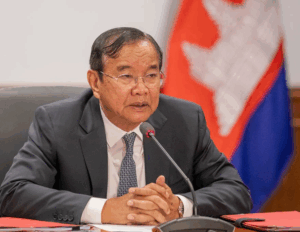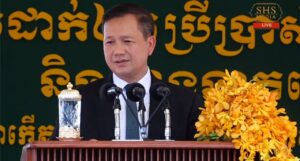(Video) Selected Comments of Samdech Thipadei Hun Manet, at the “Closing Sesson of the Extraordinary General Assembly of the National Scout Movement of Cambodia” [Unofficial translation]
[2]
(1) Scouting – a model of inspiring spirit and volunteerism, not only to benefit from but to share back to society
Organizing youth mechanisms such as scouting is part of building human capital. The word human capital is not only about ability. It must have a spirit, morality, virtue, especially a high sense of patriotism […] This is organizing of mechanism in addition to the general education mechanism. It is a model of inspiring spirit and volunteerism, not only to benefit from society in learning, training, and in getting opportunities to live in peace and development, but also knowing how to come together, seize opportunities by volunteering, and share back to society […] Each person is a social cell. Each person forms a family (and) a family forms many families, forming a village, a commune, a district, a province, a city, and country. So, a country progresses or does not progress because of each individual. We have a duty to make the country strong […] Organizing such a mechanism is a good example. Not only is it a mechanism to gather these 190,000 members to take action (in social education), but it is a model for others to continue to participate […]
(2) The goal of formulating policies, plan, implement and build internal infrastructure is protecting Cambodia’s independence and sovereignty
Ensuring Cambodia’s sovereignty is an important task at this time. Building human capacity, human resources, human capital, the economic base, and physical infrastructure are all building the foundation of all sectors on our own capabilities […] Up until now, we have been able to formulate policies, plan, and implement them ourselves, let alone build internal infrastructure. This is the goal of protecting Cambodia’s independence and sovereignty so that we can breathe on our own to survive when necessary […] Recently, not only those abroad, but those in the country woke up when Cambodia decided to take ownership of its own electricity and Internet supply without having to buy from Thailand […] From France, on the morning of June 12, I sent a message saying, “so that the Thai side doesn’t have a hard time deciding whether to cut or not, when to cut, or the company would be busy negotiating contracts, let’s cut it at 12 o’clock” […] We cut off the electricity (which comes from others), and we (still) have enough electricity (to supply). So, do you now understand what Samdech Techo has been trying to do for decades? […]
(3) As the result of peace or win-win politics, Cambodians unite and stand on their own, without having to rely on anyone
Just having ownership of two services, namely electricity and internet, everywhere in the country, without having to rely on Thailand, can show the results and concrete vision of Samdech Techo at that time […] In order for Cambodia to be strong, holding ownership, and independent when necessary […] As we ended the war, the Cambodians unite, there is no more division of territory, and opens the way for us to connect infrastructure, human resource development, and economic growth along the border, making our capabilities now, no matter what the threat may be, able to stand on our own, without having to rely on anyone. This is the result of peace, win-win politics […] Both the army, all national and sub-national institutions, jointly build (this strength). This is the spirit of building human resources for the next generation, which the Cambodian National Scouting Mechanism participates in […] to ensure Cambodia’s strong independence […]
(4) Cambodian leaders go online to communicate and explain political position to the people – nothing unprofessional in that
Cambodia’s main goal in resolving the issue of territorial integrity, national interests, national honor and people on the international stage in a responsible manner […] I saw some Thai politicians accusing Cambodian leaders, Samdech Techo and me in particular, of practicing “unprofessional politics” on Facebook […] Let’s see clearly. Firstly, each national leader has the obligation to communicate with the people at all times, especially when the situation is difficult and cannot remain silent […] Even the Thai leaders use TikTok, Facebook, etc. […] Secondly, the messages sent out are intended to explain to the people our political position […] The spokesperson issued an explanation, but it is not enough. It demanded that the political leaders clarify concerned issues so that there will be peace of mind […] Nothing is unprofessional. I wonder why they use that word. Regarding this, Cambodia has been patient. Thai leaders, politicians, extremists who are in the opposition circles, sometimes the army too, have been sending messages saying “this/that temple is in Thai territory” using their unilateral map, or cutting off electricity, cutting off the internet, and/or building a fence between Cambodia and Thailand. Is that (a way of working) professionally? […]
(5) The House and the Senate unanimously support bring the issues of Ta Moan Thom temple, Ta Moan Toch temple, Ta Krabei temple, and the Mom Bei area to ICJ
For Cambodia, what is the choice going forward? Shall we continue to accuse each other, use the unilateral map to fight over Ta Moan Thom? […] Thai political leaders since 2010, under Abhisit Vejjajiva, have claimed the Ta Moan Thom temple as theirs based on the unilaterally drawn map […] If we trade blames, there will be no losers or winners. In the decades to come, the descendants of Cambodia and Thailand will still find the same things to fight about. Whether we fought 10 years ago, today, or next year, after the fight, there would be life lost and injury, and both sides come to negotiate to suspend the fight. The matter would not be resolved. It is better to find a third mechanism to clear this issue […]
On June 2, after passing the congress (of both houses of parliament), I announced Cambodia’s position to bring the issues of Ta Moan Thom temple, Ta Moan Toch temple, Ta Krabei temple, and the Mom Bei area to the ICJ […] There was unanimous support from the House and Senate in the first historic joint congress […] We have maintained the same position since that day. From that day until June 16, when we submitted (the request) in person (to ICJ) […] Within just two weeks after Cambodia declared (its position), the Ministry of Foreign Affairs sent an official letter to the ICJ […]
(6) Through small in size, population and economy, Cambodia has the spirit of solidarity and unity as a nation
On June 15, 1962, to be honest, it was a coincidence, but it could be a good omen. Cambodia won the legal battle 63 years ago (regarding the Preah Vihear temple) […] The pestering from the (Cambodian opposition politician) has been a bothersome […] There was a woman from his group (saying) that Mr. Hun Manet and the government should show the map that is going to use in the negotiation to the people. If that’s the case, there’s no need to negotiate […] I am asking those politicians to think about the national interest. The government is working for the whole nation, for the integrity of the territory […] Please give the national officials the opportunity to do this work responsibly, to gather together to protect our legitimate interests. Don’t exploit for political interests all the time […]
I would like to commend a critic who knows the time. That brother criticized, but when we acted correctly, he came out to acknowledge it […] Please, brothers and sisters, if you are truly Cambodian, even if you do not support the government, do not issue any messages or actions that will break the spirit of solidarity and national unity […] I thank and admire our soldiers on the front lines who are brave, united, and united for the cause of defending our true land at this time […] Our country is small, the population is small, and the economic level is not high compared to the other side, but importantly what we have is the spirit of solidarity and unity as a nation at this time […]
(7) UYFC organized march shows collective spirit of our nation rallied behind the Cambodian armed forces
Tomorrow, the Union of Youth Federations of Cambodia (UYFC) will organize a march to support the government and the army, the frontline armed forces, showing their national spirit […] This shows the collective spirit of our nation. All of this is the strength and energy to help our forces, proving that what they are doing is right (because) there is a nation and people behind them, who are determined to defend absolutely, to sacrifice their lives, to sacrifice everything for the cause of protecting our territorial integrity. The government also assures us that it will do its utmost to protect territorial integrity, protect national sovereignty, and protect the interests of our nation and people absolutely. Ask, what shall we do in going forward? […]
(8) Three approaches
Let me clarify. The Royal Government’s approach/position to resolve the border issue with Thailand is, firstly, to use the technical mechanism to resolve the issue bilaterally through the existing Joint Border Committee (JBC) and, secondly, to use the legal mechanism to support the resolution of technical issues, including international laws that can support the bilateral technical mechanism. (Thirdly,) where bilateral mechanisms cannot resolve, such as the cases at Ta Moan Thom Temple, Ta Moan Toch Temple, Ta Kra Bei Temple and the Mom Bei area, and if there is an attempt to invade Cambodia by armed forces, the Royal Government and our army will be ready to defend the territorial integrity. The three approaches that we have continued to implement are technical, international law and military […] if there is an attempt to invade […]
(9) JBC resolves where can be resolved bilaterally, while where there is disagreement, and negotiation fails, go to the third mechanism.
Why not take the more than 800 Kilometers border to the ICJ? […] In the more than 800-kilometer border with Thailand, the two joint border committees have done a lot of work since 2000, and have already agreed on 43 poles. Between these 43 poles, we can agree on some borders along the waterway or a straight line that is not in dispute with each other […] There are 74 poles. They are 73, but it is counted as 74 poles because (pole) 22 has A and B. We simply call them 73 poles. We found and agreed on 43 poles. If we turn around and take one package and put it in, it means we stop working on other things […]
It is better to resolve it through bilateral mechanisms, where we can resolve it bilaterally […] The JBC will continue to do it because there is no dispute […] Where there is disagreement, we will try to negotiate. If we can’t resolve it, we will go to the third mechanism. I haven’t talked about the water border yet […] We only discuss the land border. The water border with Thailand has not been discussed yet […] There are places where discussions have been held but are not in agreement, too […] Now we will remove these four (issues). The next time, if we cannot remove issues in other places, and where there would be another armed clash, we would make another case to the court […]
(10) That Thailand still uses a unilateral map as a basis for its claim, how can a bilateral negotiation be possible
Why do we need to take these four issues to court? The Thai side is still demanding a return to bilateral mechanisms and has declared its non-recognition of the ICJ’s jurisdiction. However, whether it accepts or not, Cambodia will continue to file a lawsuit there and strive to find a solution to end this (irreconciliation). Otherwise, it will lead to a continuation of the conflict forever […] Upon my return from Japan, I went to the front to assess the situation. I discussed with Samdech Techo, HE Lam Chea (from the border affairs), and with border experts […] our assessment is that this bilateral mechanism (on the four issues) is impassable. Why? […]
Mainly, despite there is this 2000 MOU between Thailand and Cambodia, which stated that they would use maps left over from the French Indochina Geographical Group 1904-1907 […] (Thailand) still uses a unilateral map as a basis for its claim. That’s a technical matter. More importantly, politicians, including the Thai army, claim and officially declare that the Ta Moan Thom temple is theirs without negotiation. Relatively speaking, it is already in Thai territory. So, how can a bilateral negotiation be possible […] It is tantamount to claiming it unilaterally […]
(11) As troops confront each other, it is necessary to send a message to the international community to freeze the problem on the ground
One may ask which Thai government dares to resolve the issue through politics […] They are locked in. So, what choice does Cambodia have? Technical negotiations are already over […] Before the events of May 28, we might still have a way out. After what happened on May 28, when thousands of troops on both sides, guns, tanks on both sides are confronting each other already, if there is no method found to extinguish it, war could break out. It is necessary to send this message to the international community to freeze the problem on the ground. I hope that the international community will see and understand the Cambodia’s position, which this morning, Deputy Prime Minister and Minister of Foreign Affairs and International Cooperation, HE Prak Sokhonn, summoned 27 ambassadors for a briefing and share information with ambassadors abroad about the position of why Cambodia is going to the ICJ […]
(12) Cambodia will accept the court’s verdict and invite Thai side to do the same for Cambodian and Thai children to live together free from border conflicts
The Thai commander of military region 2 has made a noise that “this is our land. If you don’t leave, we will fight for it.” This threat is not Cambodia’s position. But yesterday, they said that Cambodia was threatening them. In fact, it was not. It has never been. They threatened us, and they made up stories, and they insulted us in every way. When we responded, they make noise that we threatened them […] Cambodia has exercised patience and loved peace because it has known many wars. We cannot, however, remain silent and let them continue to trample on us in every way, all the time.
We must be firm in protecting our sovereignty and national interests. Of course, we will continue to maintain friendly relations, but […] the Cambodian nation cannot be looked down upon […] If you are right, why are you afraid of the court? Cambodia is not afraid. No matter how the court decides, we will accept the court’s verdict. I hope the Thai side will do the same […] to solve the problem, so that Cambodian and Thai children don’t have to live in border disagreement together forever such as the things we cannot solve in Ta Moan Thom, Ta Moan Toch, Ta Krabey, and the Mom Bei area. Let us end it once and for all, and don’t let it remain ambiguous […]
(13) That Thai army closed the border unilaterally, they can reopen it unilaterally too
Cambodia has always adhered to the position of maintaining peace, friendship and good cooperation with Thailand and neighboring countries. In this sense, filing a complaint to the international court to resolve this peacefully is the best option that can maintain friendship and good cooperation with Thailand, and it is not to destroy it. On the contrary, if we resolve it through other means, such as armed forces, it is easy to break up this relation […] What about the border issue going forward? This issue has spread to the border closures. I have made it clear. On June 14, at the JBC meeting, the Thai side asked to put the border closure issue on the meeting agenda […] The JBC is only responsible for technical border matters. The border closure issue is not their business. Also, the Thai army closed the border unilaterally without telling us […] Well, it is easy. If it is closed unilaterally, please reopen it unilaterally. It is done. Cambodia has no intention of harming those living along the border, or affecting socio-economic relations […]
(14) Building trust through bringing border crossings to where it was before June 7 – a precondition to think about negotiations and troops adjustment
I spoke on the phone with Thai Prime Minister Paetongtarn on the night of June 15 […] I told her that any negotiations and/or troops adjustment on both sides so that they do not face each other must be based on trust as a precondition. Please build trust first by opening the border crossings to bring the situation to where it was before June 7 […] If we can restore the parity, it is a precondition to think about negotiations and more on troops adjustment. Cambodia does not like war. This is how clear it could be […] Regarding the withdrawal of the four border points from the ICJ, we do not do it. The issues have already been in deadlock already. In the past few months, it has created political pressures, even up to the point of soldiers (going face to face). The key to negotiating and adjusting the situation to the original situation is still the border crossings that were unilaterally closed on June 7 […] The ball is now in the Thai side […] May the Thai citizens, those who are affected by the transportation of products, fruits, and vegetables to Cambodia and/or through Cambodia, if there are difficulties, please tell the Thai army to open the crossings. Then it is done. Very simple […]
(15) Migrant workers are welcome; no discrimination against Thais; patients can come for treatment in the country; students get scholarships should they choose to return; and law and mutual respect – the precondition for diplomatic relations
A final message for our migrant workers in Thailand. In case you are interested in returning, I have ordered the Ministry of Foreign Affairs, the embassy in Bangkok, the consulate […] to issue letters for you. Please do not be too strict. At the border crossing, only Cambodians are allowed to come in. The seven provincial administrations along the border must be prepared to help with the Ministry of Health. If you come in large numbers, we will have transportation ready for you to return to your native villages […]
In Thailand, it seems that discrimination and looking down on our citizens are heating up […] I appeal to the Cambodian citizens in the country to take a clear stance, adhere to ethics, and do not harm or discriminate against Thais in Cambodia. Do not play that game. Let them do their own thing (on their side). There is no need for us to burn, curse, or arrest Thais in Cambodia. There are good Thais too […] Regarding going to Thailand for treatment, I have asked Health Minster Chheang Ra to be prepared. If you go (to Thailand) and cannot receive treatment, come back for treatment in the country. The Royal Government is prepared to provide treatment free of charge […] Our students too, if you choose to come back, you can get scholarships to study for free […]
However, we continue to uphold the principles, spirit of solidarity, friendship, and cooperation in all fields, but on the basis of mutual respect, equality, and respect of national sovereignty. This is the basis of Cambodia’s relations with its neighbors and other countries. Good diplomatic relations are based on law and mutual respect. This is the prerequisite for good relations in the future […]./.

